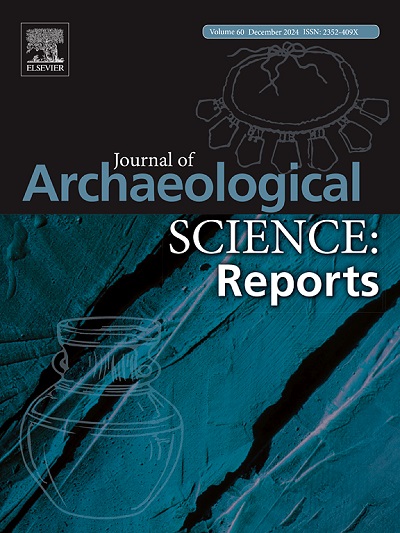Ancient mobility in northern Jordan during the Roman and Byzantine periods using stable strontium isotope analysis of human dental enamel
IF 1.5
2区 历史学
0 ARCHAEOLOGY
引用次数: 0
Abstract
The 700-year stretch from the 1st century BCE until the 6th century CE marks the period of greatest population density in northern Jordan. This agriculturally fertile region contains a number of small villages likely interconnected with each other and with the larger Roman and Byzantine population centers of Jerash (Gerasa), Umm Qais (Gadara), Quailbeh (Abila), and Tabaqat Fahl (Pella). The human mobility within these villages was explored using 87Sr/86Sr values in human dental enamel, which mirrors the origin of ingested food during childhood and thus the geological region where individuals spent their early years. Thirty-four human dental enamel samples from the archaeological sites of Natfieh, Sa’ad, Ya’amun, and Yasieleh were analyzed isotopically to identify immigration into the region as a potential source of increased population density. The results indicate that the individuals within each site received varied inputs from different geological regions during childhood, either through spending their early years in a separate location, or temporal or inter-individual shifts in the location of dietary resource acquisition. The results seem to demonstrate exceptional regional continuity and resilience even through the climate crisis of the Late Byzantine period, likely due to flexibility concerning dietary resources and economic exchange. However, the lack of clear patterns of 87Sr/86Sr variation in the region may limit larger interpretations of these data.
利用对人类牙釉质的稳定锶同位素分析研究罗马和拜占庭时期约旦北部的古代人口流动情况
从公元前 1 世纪到公元前 6 世纪的 700 年间,是约旦北部人口密度最大的时期。这个农业肥沃的地区有许多小村庄,它们之间可能相互连接,并与杰拉什(杰拉沙)、乌姆盖斯(加达拉)、盖尔贝(阿比拉)和塔巴卡特法尔(佩拉)等较大的罗马和拜占庭人口中心相互连接。人类牙釉质中的 87Sr/86Sr 值反映了儿童时期摄入食物的来源,因此也反映了个人早年生活的地质区域,我们利用这些数据对这些村庄内的人类流动性进行了研究。对来自 Natfieh、Sa'ad、Ya'amun 和 Yasieleh 考古遗址的 34 份人类牙釉质样本进行了同位素分析,以确定该地区人口密度增加的潜在来源是移民。结果表明,每个地点的个体在童年时期都从不同的地质区域获得了不同的输入,或者是通过在不同地点度过幼年时期,或者是通过饮食资源获取地点的时间或个体间转移。研究结果似乎表明,即使在拜占庭晚期的气候危机中,地区的连续性和复原力也非常出色,这很可能是由于饮食资源和经济交流方面的灵活性。然而,该地区 87Sr/86Sr 变异缺乏明确的模式,这可能会限制对这些数据的更广泛解释。
本文章由计算机程序翻译,如有差异,请以英文原文为准。
求助全文
约1分钟内获得全文
求助全文
来源期刊

Journal of Archaeological Science-Reports
ARCHAEOLOGY-
CiteScore
3.10
自引率
12.50%
发文量
405
期刊介绍:
Journal of Archaeological Science: Reports is aimed at archaeologists and scientists engaged with the application of scientific techniques and methodologies to all areas of archaeology. The journal focuses on the results of the application of scientific methods to archaeological problems and debates. It will provide a forum for reviews and scientific debate of issues in scientific archaeology and their impact in the wider subject. Journal of Archaeological Science: Reports will publish papers of excellent archaeological science, with regional or wider interest. This will include case studies, reviews and short papers where an established scientific technique sheds light on archaeological questions and debates.
 求助内容:
求助内容: 应助结果提醒方式:
应助结果提醒方式:


